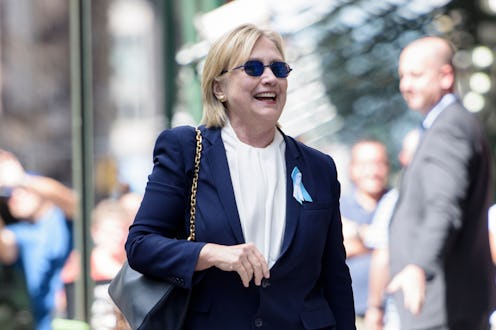News
Other Presidential Candidates Have Run While Sick
On Sunday, Hillary Clinton’s campaign announced that she has pneumonia. It’s far too soon to say how serious of a case it is, given that she was only diagnosed on Friday. But there will probably be a protracted debate about how relevant Clinton’s health is to the election, so in anticipation of that, let’s look back at some other presidential candidates who were sick on the campaign trail, and how their campaigns handled the news.
Reactions to the announcement of Clinton’s pneumonia fell along standard partisan lines: Clinton’s detractors saw the news as vindication of their longstanding claims that she’s physically unfit to serve as president, while Clinton’s supporters argued that the vast majority of pneumonia patients are just fine — and pointed to Donald Trump’s refusal to release detailed medical records of his own.
The news also raises a more basic question: How often does this kind of thing happen during presidential campaigns, and how has it been handled in the past? There’s no exact precedent — according to my research, no prior U.S. presidential candidate has contracted pneumonia on the campaign trail.* But there are two notable examples of presidential candidates who campaigned while sick, and they offer some valuable perspective on how Clinton has responded to her pneumonia diagnosis.
The first is John F. Kennedy. Despite his visible youth and boyish good looks, Kennedy was stricken with multiple illnesses for most of his life. His confirmed ailments include Addison’s Disease, measles, jaundice and Scarlet Fever. He was hospitalized more than 36 times and read his last rites on three occasions.
Kennedy’s political opponents knew something was up, and tried to make hay of it. During the 1960 Democratic primary, Lyndon Johnson’s team told the press that Kennedy had Addison’s disease, and there’s a strong (but unconfirmed) possibility that Richard Nixon’s associates broke into the office of Kennedy’s endocrinologist before the 1960 election in an attempt to leak information on Kennedy’s health.
Kennedy’s team, however, steadfastly denied all of these allegations, during both the campaign and Kennedy’s presidency. While Kennedy had divulged limited information on his health problems before his death, the full extent of his ailments wasn’t known until long after his death.
Another candidate with serious medical ailments was Franklin D. Roosevelt, who was diagnosed with polio in 1921 and was eventually paralyzed from the waist down. There’s a common belief that Roosevelt’s illness was kept secret from the public, but that’s not entirely true. The New York Times reported on his use of a wheelchair before he was elected president, and he appeared at the 1924 Democratic National Convention using crutches prior to becoming fully paralyzed. It was publicly known that he had polio.
Roosevelt’s team did take steps to prevent the media from taking pictures of him in a wheelchair. However, the bigger deception came during the 1944 presidential campaign, when Roosevelt, running for his fourth term, was extremely ill and very close to death. In July of that year, a physician who examined Roosevelt wrote a confidential memo advising that the president would likely die in office if elected to another term.
The memo wasn’t released to the public, but it turned out to be correct: Roosevelt died from a stroke three months into office.
By comparison, these precedents make Clinton’s pneumonia seem like small potatoes. In addition to the fact that pneumonia is a common illness that most patients survive without issue, Clinton isn’t hiding her condition from the public, as JFK and FDR did. Rather, her campaign made the announcement 72 hours after the diagnosis was made.
The severity of Clinton’s pneumonia won’t be known for some time. But she and her campaign have been transparent about the fact that she has an illness — and that arguably says more about her presidential qualifications than the illness itself.
*It was long believed that President William Henry Harrison, who died one month into office, succumbed to pneumonia that he contracted during his inauguration address. But he had already won the election at that point — and new evidence suggests that it may not have been pneumonia that killed him after all.
